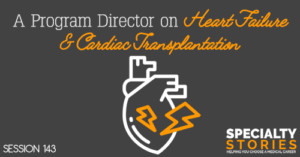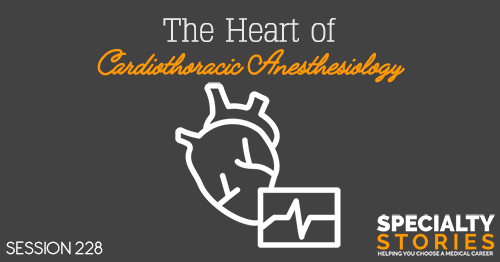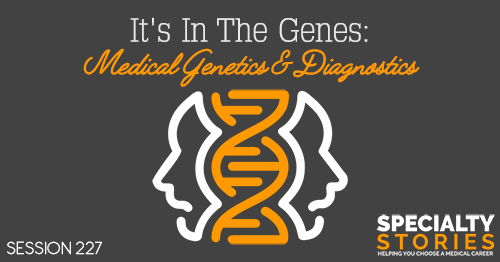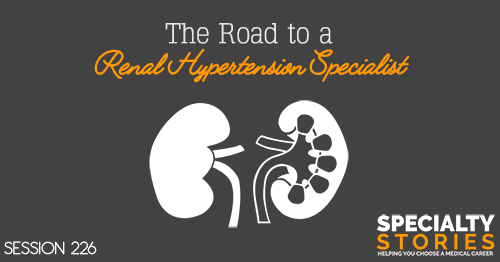Apple Podcasts | Google Podcasts

Session 143
Dr. Michelle Kittleson has a heart for hearts! She’s a cardiologist who specializes in advanced heart failure in transplant cardiology. She’s also the program director at Cedars Sinai in California for the advanced heart failure in transplant fellowship.
For more podcast resources to help you along your journey to medical school and beyond, check out Meded Media.
Listen to this podcast episode with the player above, or keep reading for the highlights and takeaway points.
[01:45] Interest in Cardiology and Heart Failure Transplant Cardiology
Michelle is the fifth generation of doctors in her family and an only child. So in fact, she had zero choice in the matter of growing up.
In medical school, she was fortunate to have a good mentor so Michelle wasn’t just blindly memorizing. She was understanding. She then happily went into internal medicine. Now her dad is a cardiologist in private practice. And he always said, cardiology is the best.
Trying to rebel, she said she’d go into pulmonary critical care or nephrology. And so, for the first year or so of residency, she tried all these specialties. But she ultimately kept coming back to cardiology seeing how amazing it was.
She found the heart to be very interesting. She also had an amazing mentor who was an advanced heart failure transplant cardiologist.
Michelle never realized there were so many terrible ways that you could die until she went through the oncology rotation or the pulmonary critical care rotation. Whereas in cardiology, it seemed much more that she could deal with the death.
Another thing that she loves about cardiology is that history matters. For example, you can’t diagnose unstable angina without a history. You can have a totally normal EKG, you can have a totally normal proponent, yet there could be a clot just teetering on the precipice of the ostium of the left anterior descending artery.
“It's only the history, that crescendo pattern, that scary trajectory of exertional discomfort that tells you that something scary is going on.”Click To TweetBy the same token, the physical exam matters. You can’t diagnose decompensated heart failure without a physical BNP. You need to look at the lower extremities. You need to put it all together.
In cardiology, you can also never have to just do one thing. There’s a little bit of imaging, there’s a little bit of chronic outpatient management, a little bit of really exciting, serious cardiogenic shock management. There are procedures. You can fashion your career to be whatever it wants.
She ultimately settled on advanced heart failure transplant cardiology. Her mentor was an advanced heart failure transplant specialist.
Also, her grandfather (third in the five generations of physicians in their family) was the founding dean of this medical school in Bangalore, India, where her parents both happened to attend. That’s where they fell in love and got married.
Her grandfather ended up having ischemic cardiomyopathy that worsened. He had a bypass surgery in the 1980s when Michelle was still in elementary school and did well relatively but died when she was doing residency.
Because of the ability to do so much good and to employ so many different skills at the same time, heart failure transplant became the field for her.
[09:36] Drawing the Line Between a Heart Failure Transplant Cardiologist and Actual Surgeon
Michelle loves the multidisciplinary collaboration that is the field of heart transplant.
Basically, every transplant program, by policy, has these heart transplant selection committee meetings. So when a patient is brought up as a potential heart transplant candidate, they’re discussed on the committee. This includes cardiologist surgeons in addition to other specialists, including psychiatrists, social workers, pharmacists, nutritionists, etc.
They discuss if the patient is sick enough for transplant and if the rest of their body is well enough.
“The way we work together is in the decision.”Click To TweetUltimately, the surgeon’s domain is the operating room. When they’re in the operating room. It’s all them. The minute they leave the operating room, it is shared. The cardiologist generally manages the antirejection medications. Then the post operative chest tubes, putting out the vent settings are more of a collaboration.
[13:01] Traits that Lead to Becoming a Good Transplant Cardiologist
The skills you need to be a good heart failure transplant cardiologist are really the same skills you need to be a good doctor in general. This includes having great attention to detail.
“The detail-oriented approach serves you well no matter what.”Click To TweetSecondly, you have to be able to work well with others. Her mantra to new fellows is “be nice and work hard.”
Being nice is really important in all of medicine, and specifically in heart failure transplant as their world gets more and more complicated. It’s so rare to manage a single patient without another consultant in the mix, whether inpatient or outpatient.
The key for advanced heart failure transplant is knowing the right questions to ask. She may have a patient who requires a heart transplant who has one of those other conditions.
So it’s important for her to know the right questions to ask the consultants. Then be able to work well with the consultants to figure out if these other issues make them an appropriate heart transplant candidate or not.
[15:05] Typical Day
There are different flavors of advanced heart failure transplant cardiologist. There are some who are fully academic, who have protected research time. There are some who are fully private practice who don’t engage in more academic pursuits like research, administration, education.
Michelle is a hybrid. Her career, in general, is 100% clinical and 10% research.
Michelle does four months on the inpatient service either cardiomyopathy service where they have end-stage heart failure patients who are waiting in the hospital for transplant. Or heart failure service where patients who come in for a tune-up and are well enough to go home.
Then two months would be on to transplant service. These are patients who have fresh transplants in the hospital recovering or those readmitted post-transplant with various issues.
Michelle also does the clinics. There are usually 25 patients scheduled over a morning. Then she spends time doing procedures. That’s what’s so exciting about the field of heart transplantation. She can do heart transplant biopsies, diagnostic angiograms, right heart catheterizations.
That’s appealing to her because she doesn’t like to do any procedure that takes longer than 15 minutes.
So a typical day may look like rounding in the morning with the fellow nurse practitioners and residents from 730 to 1030. From 1030 to noon, might be catching up on notes, maybe popping over to the heart transplant clinic.
If they’re short-staffed, she’s helping to see some patients. Lunch might be giving a lecture to medical students. And then the afternoon might be her general cardiology clinic. Or she sees patients who have AFib or history of a stent a year ago or new onset palpitations, but don’t necessarily have heart failure so she can keep all her skills sharp.
[18:12] Taking Calls
Michelle is well-buffered by the fellows who take first call and their heart transplant coordinators who are nurses specialized in the field of heart transplantation. So if a heart transplant patient calls, they are routed to a heart transplant nurse coordinator.
In the American healthcare system, we have the availability of high level emergency room care. So there’s always that buffering.
Unlike other specialties in cardiology, like the interventional cardiologists who again are built completely differently than she is, they thrive under this pressure. They would have to rush into the hospital in the middle of the night multiple times a night if they’re on call. But as a heart failure transplant cardiologist, that would not necessarily happen.
[21:10] Life Outside of the Hospital
“You have to pick your specialty by what you love and not the lifestyle because your personality ultimately dictates your lifestyle.”Click To TweetYou can have a life outside of medicine. And your personality will dictate more than anything else, how much you feel you need to do outside of the bare bones to keep your patients alive. When other things are important, other things take precedence.
Michelle believes that life happens in stages. She went through the stage as a junior attending, when she was kind of excited about research and she wanted to do more stuff. She didn’t have kids back then so she’d have more time for those. At the end of the day, you just have to put your energy where it needs to be.
You can carve out whatever lifestyle you want. That being said, she doesn’t think that the sky’s the limit.
Moreover, there are certain specialties for which flexibility is not built into it. Heart failure transplant is quite flexible in the sense that if she’s on call, and she has a certain amount of patients scheduled, she knows when her day is going to end. Then she can plan to attend the parent teacher conference. Or she can block off time for the talent show and that is very rewarding.
[24:58] Training Path
After undergraduate and medical school work, there’s three years of Internal Medicine Residency, followed by three years of a general cardiology fellowship. Then it’s followed by one year of advanced heart failure transplant cardiology fellowship.
“It is an ACGME accredited fellowship so it comes with its own standard curriculum objectives, rotations and board examination.”Click To TweetCardiology in general is competitive but competitiveness in heart failure transplant cardiology fellowships are probably less. Up until recently, there was not a match for heart failure transplant cardiology fellowship.
To best position yourself to be a good candidate, be sure to do well on your rotations.
Get to know your patients very well. When you’re presenting on rounds, make sure you know what you’re talking about.
When it comes to letters of recommendation if a resident wants to go into cardiology, they will be really trying hard to get letters of recommendation from cardiology attendings. And that’s not necessarily a bad thing. Amazing compliments are great no matter who they come from, even though you’re going to focus on cardiology.
Second is research. There’s certainly the perception among cardiology fellowship selection committees, especially ones at academic centers that you need to have a track record of research before you apply.
Don’t pick the research topic. You pick the mentor. When you are as uninformed as a medical student or resident, it doesn’t really matter what the topic is. You just need good mentoring that will end with a good outcome. And the best source for that is usually the senior residents or the fellows in your center. Ask for advice.
The third thing is that word of mouth is important. Once you’ve interviewed in your programs, don’t be afraid to reach out to your program director as well.
[35:12] Negative Bias Towards DOs
Being the program director for their advanced heart failure transplant fellowship and on the selection committee for their general cardiology fellowship, she doesn’t think they pay attention to whether it’s MD or DO at all. If someone is motivated enough to pursue this avenue of specialization, that’s kind of all you need to know.
That being said, she doesn’t discount that bias exists out there. But she has never witnessed it personally.
But if you want to be respected in this male dominated world, you have to do twice as much to be considered half as good. Just keep your head down. Work as hard as you can. Get the strongest letters. Then you realize you’ve done something in your power to knock down some of that bias moving forward.
“Accept that bias may exist out there. But be optimistic by the fact that there are programs out there that really pay no attention to that.”Click To Tweet[37:50] Message to Future Primary Care Providers
One thing she would like primary care physicians to know about advanced heart failure transplant cardiology is that when someone has “end stage” advanced heart failure, there is still hope.
There is hope because these new medications can continue to transform the outcomes of patients with advanced heart failure.
“Transplant patients are like normal people, they go back to work, they lead normal lives.”Click To TweetSo if she had to tell a primary care physician, it’s don’t write the patient off just because their EF is 10% and they keep being hospitalized for heart failure. Refer the patient now. They may still have contraindications. They may not be a candidate, but it never hurts.
Their life can still be, not only prolonged but their quality of life improved through therapies that exist.
Lastly, timing is key. She would much rather have a patient referred to her prematurely when they’re too well, rather than wait till they’re too sick.
[40:40] Final Words of Wisdom
It is an enormous privilege to be part of patients’ lives when death is imminent. Whether the patient doesn’t survive, or if they have the greatest triumph and miracle and have a wonderful outcome, regardless. It’s rewarding knowing that you can be there to establish trust and guide them through the medical complexities.
The decision that’s right for them and being able to sustain a long term relationship is so rewarding, both medically, scientifically, and emotionally.
Links:
Listen to Other Episodes
[smart_podcast_player url=”http://medicalschoolhq.libsyn.com/rss” color=”004075″ show_name=”The Premed Years” ]
SEARCH SITE
LISTEN FOR FREE











